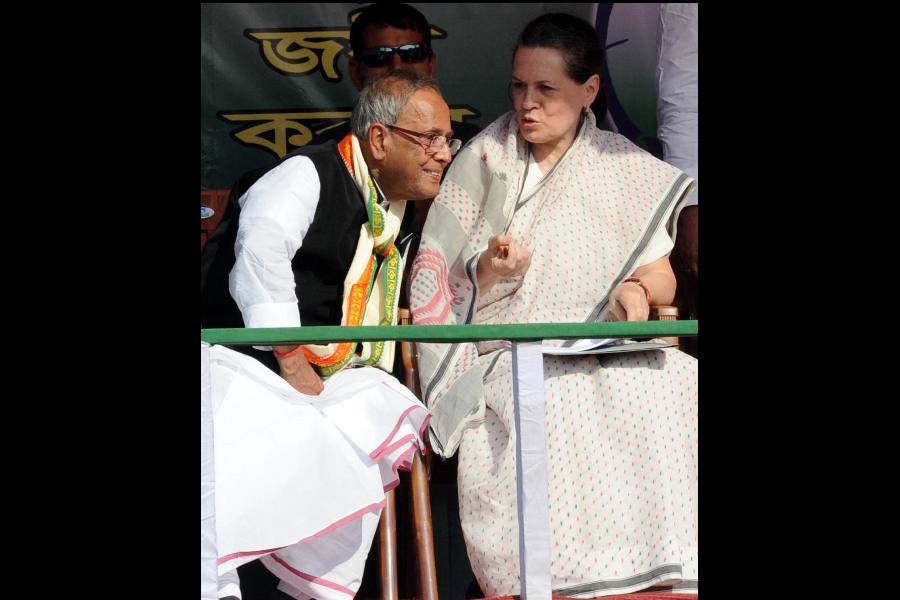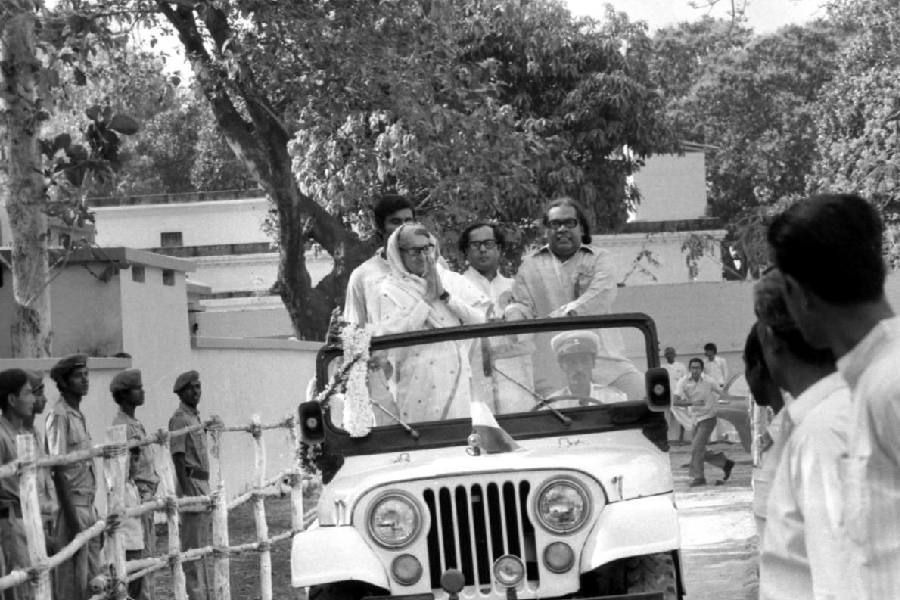In his post-retirement days, I frequently asked my father about the revival of the Congress. His consistent response was that the Congress must and will revive. On one occasion, he got irritated with me and said, “The task of reviving Congress is not your responsibility. Leave it to the Congress president and other senior leaders of the party. You concentrate on the task assigned to you by the party.”
On 24 May 2014, just a few days after the Lok Sabha election results were declared, Pranab noted in his diary:
Blame-game in Congress/UPA is going on as usual. It is not unexpected. A major debacle like this has its impact. But the shameless manner the cronies of Rahul Gandhi are behaving would further damage the party. But all is not lost and if genuine corrective measures are taken, Congress can revive. The restoration of internal democracy in party, decentralization of authority in AICC, PCC, DCC and BCCs are needed. Committees should be constituted as per rules and norms. Membership from booth is to be reintroduced. Even if there be some fake/bogus membership, it would be much better than no membership or ad hocism. Congress leadership must allow grassroots support to grow under the local leaders from Anchal/Block/Taluka level to DCC and PCC. If this happens, there will be no need to raise slogans like “Priyanka Lao Congress Bachao”.
My father never had in-depth discussions with me regarding the prospects of the Congress, apart from a few casual remarks made in unguarded moments. He perhaps thought it was better not to dishearten me, as I was a Congress worker. In his diaries, he never provided a comprehensive analysis at any point in time.
But going over his diaries over the years, especially during the later years, I tried to gauge his thoughts. There’s a telling observation as early as December 1975 in the context of the AICC session in Chandigarh. Pranab noted:
What was noticeable in this session that there was no dissenting voice... Within Congress, there has always been a diversity of opinions due to which a consensus within Congress could broadly be considered as a national consensus on issues. One of the reasons why no national opposition or alternative to Congress could emerge was the ubiquity of Congress... I do not understand the reason for this [lack of dissent/diversity of opinions] and I don’t know if it’s good for democracy.
It took Pranab more than 40 years to admit to himself that, perhaps, all was not well with his mentor Indira Gandhi.
In his post-retirement diaries, there are references to Indira’s “feet of clay”. He thought that the two splits in the Congress in 1969 and 1977 had weakened the organization. A personality cult and a cult around the Gandhi-Nehru family started developing during Indira’s time. Perhaps, due to her own insecurities, Indira wanted to be in total control of the organization. In 1974, the party constitution was amended to give more power to the Congress president, even allowing her to remove elected CWC members. She systematically decimated all regional stalwarts and centralized power within the organization to herself. She unabashedly promoted her sons, first Sanjay, then Rajiv after Sanjay’s death. Indira encouraged factionalism within the party and ensured that no one faction/leader became powerful enough to challenge her. The elections within the party were replaced by the “nomination” culture, with the Congress leaders authorizing the Congress president to nominate not only the CWC members but even CLP leaders and CMs in states.

AFTER PARTY: Sonia Gandhi and Pranab Mukherjee campaigning in Malda before the 2011 West Bengal Assembly elections. File picture
Indira was the main “vote-catcher” for the Congress, and had the charisma and political acumen to carry it through. Her spectacular victory in 1980, after the 1977 electoral debacle, reinforced her own and the Gandhi- Nehru family’s dominance within the party. This concentration of power and the cult around the family within the Congress led to sycophancy and a belief that only a member of the Gandhi-Nehru family could lead the party and lead it to victory. In an entry on 18 December 1998, in the context of a special AICC session held in Talkatora Stadium in Delhi, Pranab noted sarcastically, “The whole session was ‘Sonia-Vandana’. Nobody can beat Congressmen/women in sycophancy. Except me, everyone took her name at least half a dozen times in a speech of five minutes.”
Pranab himself was guilty of this “sycophancy” to the extent that he too came to believe and accept the inevitability of a Gandhi-Nehru family member to lead the Congress.
That’s why he chose to play an active role in making Sonia the Congress president, replacing Sitaram Kesri. In his later-day reactions, he thought that Sonia’s desire to form coalition governments with support from regional parties had further weakened the organization. Rather than strengthening the organization, the focus was to form the government, even at the cost of sacrificing the interests of the local state units to the compulsions of a coalition government at the Centre. I remember hearing a fleeting conversation between him and Sonia during one of her visits after his retirement. As I entered the room to serve tea, I heard Pranab saying, “I still stand by the Pachmarhi resolution.” At the Pachmarhisession of the Congress in 1998, the party resolved to go on its own and not cede space to regional parties by forming coalitions. It was reversed in 2003 in Shimla, where a resolution was passed making way for collaboration with other parties to form governments.
On 3 February 2016,Pranab wrote:
A large number of people are leaving Congress. They are frustrated and it seems that even in the near future, there is no prospect of its revival. This is haunting a large number of Congress leaders and workers. Coalition politics with a strong desire of Gandhi-Nehru family, to which Congress has mortgaged itself, to keep power to itself has led to this situation (sic).
On 6 June 2016, at the presidential retreat of Mashobra, Pranab noted:
In this solitude, one thought for the last few days constantly haunting me now what is the future of Congress? (sic) Would it revive like it did under leadership of Indira Gandhi or would it be like an opportunistic, capricious and fragile coalition govt headed by Congress? Or would the Congress simply disintegrate, and outfits like TMC and NCP having some elements of Congress ideology replace it? I do not have any answer. It is difficult for me to believe a “Congress Mukt Bharat”. Congress is a national movement — its liberalism, firm commitment to parliamentary democracy and secular approach are at the core of India’s nationhood. Can BJP transform itself into Congress ideological mould and expand without RSS support? Future of India is at stake and the stake is too high.
Before the general elections in 2019, Mamata Banerjee floated a concept of united Opposition with one candidate from a united Opposition contesting against the BJP in a given constituency. Pranab wrote:
Mamata Banerjee is speaking about putting one candidate against BJP in all constituencies. Now the question is which parties will form the Federal Front? All the regional parties like SP/BSP, TMC, TRS, TDP, BJD etc? Where does Congress fit in this framework? Can it liquidate itself by conceding to regional parties in state after state? Has the relevance of Congress in the national politics of the party is gone forever? (sic) Is Congress in a permanent state of decline or is it reversable? It is theoretically possible to have third front but without Congress it will be impotent. Regional parties at the cost of a national party?
He firmly believed that a combination of regional partiesat the Centre cannot be a substitute for a national party. As per him, a government formed through such arrangements would be extremely fragile. Further, no regional party would have a national outlook. According to him, thiscould be detrimental to India’s interests in the long run, especially in areas like foreign policy, which might get subverted to the interests of local domestic politics. He illustrated this to me once, using the examples of Mamata Banerjee’s opposition to the Teesta Water Sharing Treaty with Bangladesh, and of Tamil parties’ domestic political compulsions in influencing India’s policy towards Sri Lanka.
On 28 July 2020, just a month before his passing, Pranab wrote in his diary:
By making Congress a preserved playground for Gandhi-Nehru family, Congress lost its democratic character which impacted the polity of the country. After independence, if five family members of the same family controlled the Congress presidency for 37 years, it speaks of the worst form of hegemony. The family today is no longer providing vitality to the organisation but eating away its strength. Sonia Gandhi and Rahul since 2004 have lost base it acquired even partially by Soniaji in 2001-2003. They are just interested in somehow to form government at Centre under Congress with other regional parties.
Pranab continued:
Sometimes I think how far I am and people like me are responsible for this decline? (sic) Did the blind loyalty of people like me to Indira Gandhi in the 70s and 80s, and later to Sonia Gandhi greatly responsible for mortgaging the party to the family? (sic) Are we not accountable for stopping the democratic process of choosing the leader through election by the party members? People like us are responsible for allowing Congress to disintegrate and become a family fiefdom.
Pranab’s day of reckoning was finally here.
It was during this time that I began contemplating leaving politics. The thought arose after the Congress party’s disastrous defeat in the Delhi Assembly elections in February 2020. We not only failed to win a single seat for the second time, but our vote share had also fallen to a pathetic 4.26 per cent. I was depressed not merely because of the defeat, but also for what I perceived as lack of fighting spirit and an indifferent attitude of the party’s leadership — including the top echelons of the party — towards the election.
With much trepidation, I asked my father during one of our dinner-time conversations, “Baba, would you feel very bad if I quit politics?” Pat came the reply, “When did you do politics that you would quit?” Normally, I would’ve reacted to such a dismissive attitude, but I chose to overlook it as my purpose was solved and I felt relieved. I also reassured him that I did not have any intention of joining any other political party. He quoted a Sanskrit phrase, “Swadharme Nidhanam Shreyah [It is better to perish in your own dharma]. Always remember that Congress is your Swadharma.” Congress is still my “Swadharma”and I still, ideologically, belong to the Congress.But that Congress, perhaps, now exists only in the pages of history.
Excerpted with permission from Rupa Publications










